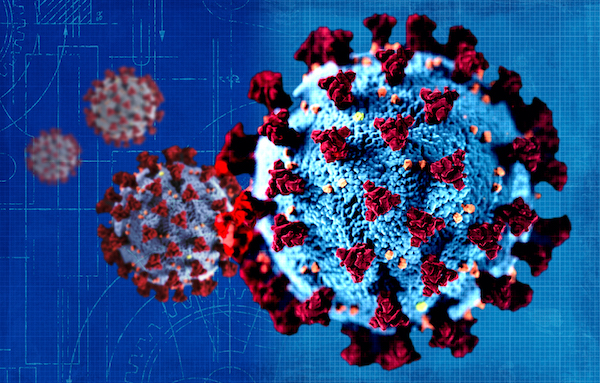COVID-19 variants multiply globally
January 25, 2022
As COVID-19 spreads around the globe, variants of the virus have developed and begun to spread on their own. With Alpha, Beta, Delta, which has spread through nations, and the latest two, Omicron and Flurona, the virus only seems to be getting stronger as new variants are identified.
Alpha
Found in November 2020, the Alpha variant was one of the first to be of concern. First noticed in Britain, it slowly spread throughout and even became one of the prominent variants in the United States. This easy transmission suggested that Alpha was easily spread compared to the original virus. According to Yale Medicine, scientists identified Alpha as more likely to lead to hospitalization and even deadlier than the original virus. It mutated to suppress the human body’s initial immune response to infection, making it easier to severely hurt the immune system of the body. Mutations found in the Alpha variant are also importantly similar to the mutations found in the Omicron variant.
Beta
Discovered in May 2020, the first case of the Beta variant was found in South Africa. The discovery of the Beta variant is what launched the country, and later the globe into a second wave of the pandemic. This variant was also seen as more likely to hospitalize people and have them require serious critical care. In Qatar, people infected with the beta variant were 57% more likely to die from the infection, according to Laith Jamal Abu-Raddad, an infectious-disease epidemiologist at Weill Cornell Medicine. Though this deadly variant has seemed to disappear, making a way for Delta and Omicron, scientists are not underestimating its capability to reappear.
Delta
The Delta variant was first identified in India and spreads especially quickly and easily. Vaccines and masks are assumed to be effective in preventing the severity of the variant in most cases. Despite this, breakthrough infections are still possible, and vaccinated people can still spread the Delta variant to others. Delta, like some other variants, does respond to monoclonal antibody treatments in the United States.
Omicron
The Omicron variant has spread even faster than the original strand. It was first found in Botswana on Nov. 11, 2021, and was announced as a Variant of Concern in the U.S. on Nov. 30, 2021. Dec. 1, 2021, the first case of Omicron in the U.S. was identified. Due to the recency of this variant, not much is known on how people can fight this virus except the existing practices the CDC has told the public to follow for the other variants. There has also been some doubt whether or not cloth masks are able to protect people from contracting the Omicron variant. The CDC is still advocating for everyone above the age of 5 to get fully vaccinated, as severe illness, hospitalization, and death due to Omicron can be prevented.
Flurona
Flurona is when a person suffers from coinfections of both influenza and COVID-19. The term Flurona does not refer to a new disease where the viruses have mutated together, it simply means a person has both diseases at the same time. Cases have been found in Israel, the Philippines, Hungary, Brazil, and the United States. Doctors have been worried about the possibility of a ‘twindemic,’ especially during flu season. According to the Washington Post, cases of Flurona have been reported ever since 2020. In February 2020, when New York City still had not reported any cases of COVID-19, a man tested positive for influenza and later tested positive for COVID-19 soon after. In one instance, a 16-year-old from Brazil, vaccinated for both, tested positive for Flurona, but only experienced mild symptoms. The mother of the teenager credited the mild symptoms to the vaccines. It has been proven that patients with the coinfections who were not vaccinated become extremely sick, whereas patients who took the vaccine and were boosted did not suffer nearly as much.
Conclusion:
The variants seem to have relations to each other, not just the original strand, like how the Delta and Omicron variants are similar to the Alpha variant. With each variant mutating to get past the human immune system even further, COVID-19 does not seem to be getting weaker. Variants like Alpha and Beta have seemed to lessen in case numbers. Though this seems like good news, it indicates that Delta, Omicron, and Flurona are affecting the global population at much quicker rates. To prevent contraction of the virus, one should make sure to continue all COVID-19 guidelines set since 2020, including: wearing a mask, social distancing, getting the vaccine (for ages 5 and up), getting the vaccine booster (for ages 16 and up), etc.



